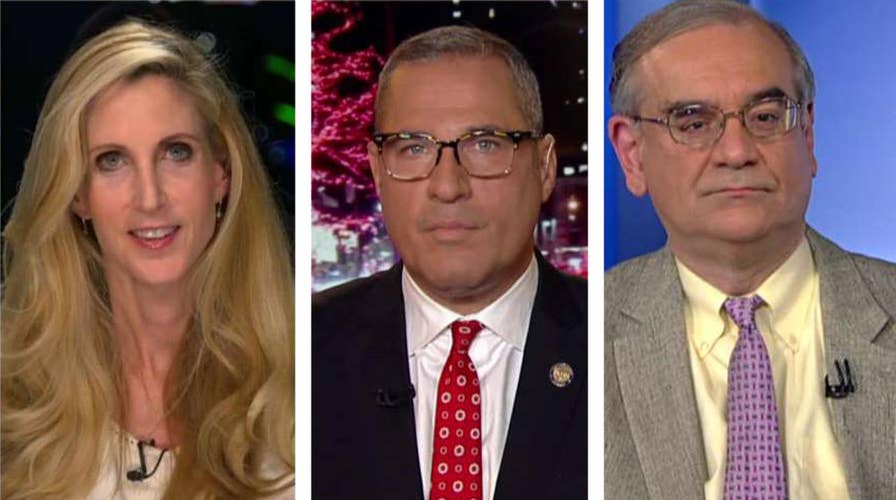Trump faces backlash for 's---hole countries' comment
Reaction on 'The Ingraham Angle' to the president's remarks on immigration.
President Donald Trump's "s---hole countries" remark Thursday drew sharp reactions from the U.N. human rights office -- as well as the nations to which the president referred in his comment.
It also prompted the U.S. government's Africa Media Hub to issue a statement reiterating the U.S. commitment to working with its African allies.
"US deeply respects the people of #Africa & values its partnerships with them," the tweet read in part.
The U.N. office said Friday that Trump's reported use of an expletive to describe Africa and other countries could "potentially damage and disrupt the lives of many people."
U.N. spokesman Rupert Colville said that "you cannot dismiss entire countries and continents as `s---holes'."
He said Trump's reported comment could endanger lives by potentially fanning xenophobia: "It legitimizes the targeting of people based on who they are."
Colville says Trump's reported comments "go against the universal values the world has been striving so hard to establish since World War II and the Holocaust."
Meanwhile, the U.S. government's Africa Media Hub was trying to put out the flames sparked by Trump's comments.
Without directly referring to Trump's statement, a tweet said that "US remains committed to working together w/Africans to realize the promise of a more peaceful, more productive, more prosperous 21st century Africa. US deeply respects the people of #Africa & values its partnerships with them."
Haiti requests meeting
Haiti's ambassador to the U.S. has formally requested that a Trump administration official explain the comments, according to reports.
Ambassador Paul Altidor told journalist Yamiche Alcindor on Thursday that he and the government of the Caribbean nation “vehemently condemn” what the president said and do not understand why he made the comments.
Haiti's ambassador also brought attention to the nation's enduring relationship with the U.S., noting that the country's soldiers had fought alongside America as far back as the Revolutionary War.
African nations react
In Africa, some governments found themselves in an awkward position. As top recipients of U.S. aid, some hesitated to jeopardize it by criticizing Trump.
In South Sudan, government spokesman Ateny Wek Ateny said that "unless it was specifically said about South Sudan, we have nothing to say."
But African media outlets and the continent's young, connected population were less shy.
"Casual Friday at the White House is soon to include hoods and tiki torches at this rate," South African media outlet Daily Maverick wrote.
South Africa's ruling party is calling Trump's comment on African immigrants "extremely offensive."
Deputy Secretary General Jesse Duarte of the African National Congress told reporters that developing countries have difficulties but noted that the U.S. itself has millions of people out of work or without health care.
The African Union said it was "frankly alarmed" by Trump's statement.
"Given the historical reality of how many Africans arrived in the United States as slaves, this statement flies in the face of all accepted behavior and practice," AU spokeswoman Ebba Kalondo told the Associated Press.
"This is particularly surprising as the United States of America remains a global example of how migration gave birth to a nation built on strong values of diversity and opportunity."
White House comments
The comments were directed at people from Haiti, El Salvador, Honduras and African countries during bipartisan talks on immigration that were held inside the White House.
The president added that the U.S. should admit more people from countries like Norway, the Washington Post reported.
The White House responded with a statement, but did not deny Trump had made the comments.
“Certain Washington politicians choose to fight for foreign countries, but President Trump will always fight for the American people,” White House spokesman Raj Shah said.
The Associated Press contributed to this story






















